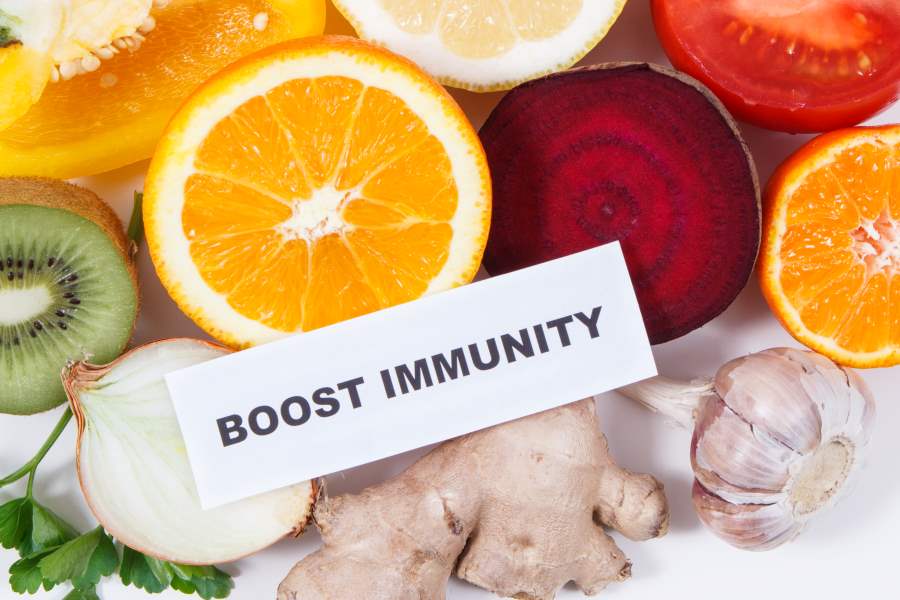4 Vitamins and Supplements to Improve Your Immune System

If you are looking for an immunity booster, know that vitamins help fight diseases and protect human cells from damage. Hence, consuming a balanced diet with the nutrition required for complete well-being is essential.
Keep reading to find which vitamins are good for immunity and the respective food sources. It will help you plan the proper diet.

Table of Contents

Top 4 Vitamins to Boost Immunity

Dieticians and nutritionists suggest consuming nutrient-rich food. Nutrients like vitamins are a small amount of organic compounds the human body needs. Since our bodies cannot produce them, getting them through food is ideal.
Nearly 13 recognised vitamins are either soluble or dissolvable in fat or water. The body stores fat-soluble vitamins in the liver and fatty tissue. However, water-soluble vitamins are excreted from the body via urine.
Check the list below to find which vitamins increase immunity and which are the best food sources.
| Vitamin | Description |
| Vitamin E |
|
| Vitamin A |
|
| Vitamin C |
|
| Vitamin D |
|
These are some of the best vitamins for the immune system that you must include in your diet. However, it is advisable to consult a doctor regarding the proportion and chances of infection.
As the old saying goes, excess of anything is always bad. Consuming vitamins rich in surfeit can lead to major health issues.
Food Sources for Vitamins to Increase Your Immunity
A daily intake of food sources high in vitamins will ensure an adequate intake. Here is a list of vitamins and the food sources containing them:
| Vitamin | Food sources |
| Vitamin A | Dairy products, carrots, liver, fish oils, leafy greens, tomatoes, squash broccoli, cantaloupe, etc. |
| Vitamin C | Citrus, broccoli, kale, cauliflower, kiwi, papaya, peppers, orange juice, sweet potato, cantaloupe, strawberries, tomatoes, etc. |
| Vitamin D | Egg yolks, fortified milk, salmon, fortified foods such as breakfast cereals, liver, etc. |
| Vitamin E | Wheat germ, almonds, sunflower seeds, leafy green vegetables, nuts, kiwis, vegetable oils, etc. |
Recommended Daily Intake of Different Vitamins
Vitamins play a crucial role in our immunity as these small micronutrients are responsible for various bodily functions. Here is the recommended daily intake of these vitamins to promote immunity.
| Vitamins | Recommended Daily Allowance |
| Vitamin A | 700-900 mcg |
| Vitamin C | 75-90 mg |
| Vitamin D | 600-800 IU |
| Vitamin E | 15 mg |
Useful Tools to Track Your Health
Side Effects of Overconsuming Vitamins
Here is a list of side effects of consuming a high amount of vitamins to boost the immune system for adults -
- Vitamin A - High intakes of some vitamin A forms can harm health. For instance, consuming high beta carotene can turn the skin yellow-orange. It can also cause dizziness, nausea, headaches, etc.
- Vitamin D - The chances of consuming vitamin D via food is impossible. However, if there is a chance of hypervitaminosis D due to medicine choices, it can lead to calcium buildup. This can cause kidney and knee conditions.
- Vitamin E - Vitamin E toxicity occurs rarely. It can cause muscle weakness, nausea, bleeding risk, diarrhoea, and fatigue.
- Vitamin C - Conditions like excess dietary vitamin C are unlikely to be harmful. However, excess consumption causes issues such as abdominal cramps, diarrhoea, vomiting, nausea, etc.
Dietary and Lifestyle Tips for Boosting Immunity

Having a strong immune system is crucial for the body to fight infections and diseases. Here are some dietary and lifestyle suggestions that can improve your immune system.
1. Eat Different Kinds of Fruits and Vegetables
Including citrus fruits, berries, leafy greens, and root crops such as carrots and sweet potatoes is essential since they contain necessary minerals, vitamins and antioxidants that support the immune system.
2. Include Foods Rich in Proteins
Different sources of proteins such as lean meat, fish, eggs, poultry, and vegetarian protein foods like nuts and seeds provide amino acids and healthy fats for building up the immune cells.
3. Introduce Probiotics
Fermented products such as yoghurt with live cultures, kefir, etc., can achieve a healthy gut microbiome, an important factor for a strong defence mechanism.
4. Use Spices and Herbs
Spices and herbs such as garlic and ginger have antimicrobial properties, while turmeric has an anti-inflammatory effect. These properties help strengthen immunity and act as valuable additions to a healthy diet.
5. Stay Hydrated
Water intake and herbal teas with broths should be increased to ensure adequate hydration and keep mucous membranes intact to guard against various infections.
6. Limit Sugars Plus Processed Foods
To maintain good health, it is important to watch your sugar consumption, as excessive sugar consumption might lead to weakened immune systems. Similarly, processed foods do not have complete nutritional content, so they must be minimised.
7. Stay Fit
Try to engage in at least 30-40 minutes of moderate-intensity exercise every day, such as going for a brisk walk or bike ride. Include strength training exercises to boost general fitness and the immune system.
8. Have Enough Sleep
On average, people sleep between 7 and 9 hours a day. They should maintain a regular sleeping schedule and create an environment conducive to rest. This allows the body to heal itself while also supporting its immune defences.
9. Stress Management
This may include mindfulness, meditation, yoga, and engaging in activities that you enjoy. These activities can help reduce stress levels and, thus, maintain a strong immune system.
10. Avoid Cigarettes and Moderate Alcohol Intake
Smoking makes your immune system weak hence it increases the probability of getting infected, while excessive drinking impairs the functioning of the immunity so it is good to avoid smoking and limit alcohol consumption.
11. Proper Personal Hygiene
Regular soap hand washing with water, avoiding close contact with sick people, and keeping your surroundings clean are important ways of preventing infections.
12. Maintain Healthy Body Weight
Extra weight can impair the body’s immunity, so it is very important to have a balanced diet and exercise regularly to attain a healthy weight that supports the immune system.
Supplements and Their Role in Boosting Immunity
Supplements can support the immune system, especially when individuals are unable to eat enough or face challenges. Some of the most significant supplements include vitamins C and D, which prevent oxidative stress and help immune cells function, and zinc, which is vital for the normal development of immune cells.
Due to their antiviral qualities, natural supplements may lessen the length and severity of colds. Probiotics are good at preserving gut health, which is central to overall immunity. On the other hand, omega-3 fatty acids can adjust inflammation.
Even as these products can fill nutritional gaps, they should accompany healthy eating patterns, regular physical activities, sufficient sleeping time, and stress management skills. Before commencing new supplements, it is important to consult healthcare practitioners who will customise them based on one’s health requirements.
Protect What Matters - Explore Other Insurance Options














